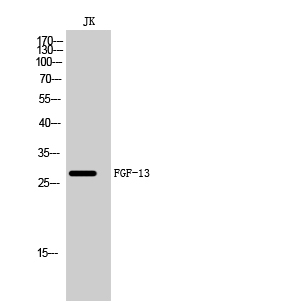FGF-13 Polyclonal Antibody
- SPECIFICATION
- CITATIONS
- PROTOCOLS
- BACKGROUND

Application
| WB |
|---|---|
| Primary Accession | Q92913 |
| Reactivity | Human, Mouse, Rat |
| Host | Rabbit |
| Clonality | Polyclonal |
| Calculated MW | 27564 Da |
| Gene ID | 2258 |
|---|---|
| Other Names | FGF13; FHF2; Fibroblast growth factor 13; FGF-13; Fibroblast growth factor homologous factor 2; FHF-2 |
| Dilution | WB~~Western Blot: 1/500 - 1/2000. ELISA: 1/5000. Not yet tested in other applications. |
| Format | Liquid in PBS containing 50% glycerol, 0.5% BSA and 0.09% (W/V) sodium azide. |
| Storage Conditions | -20℃ |
| Name | FGF13 (HGNC:3670) |
|---|---|
| Synonyms | FHF2 |
| Function | Microtubule-binding protein which directly binds tubulin and is involved in both polymerization and stabilization of microtubules (By similarity). Through its action on microtubules, may participate in the refinement of axons by negatively regulating axonal and leading processes branching (By similarity). Plays a crucial role in neuron polarization and migration in the cerebral cortex and the hippocampus (By similarity). Regulates voltage-gated sodium channel transport and function (PubMed:15282281, PubMed:33245860, PubMed:36696443). May also play a role in MAPK signaling (By similarity). Required for the development of axonal initial segment-targeting inhibitory GABAergic synapses made by chandelier neurons (By similarity). |
| Cellular Location | [Isoform 1]: Nucleus [Isoform 3]: Cytoplasm. Nucleus [Isoform 5]: Cytoplasm {ECO:0000250|UniProtKB:P61329}. Nucleus {ECO:0000250|UniProtKB:P61329} |
| Tissue Location | Ubiquitously expressed. Predominantly expressed in the nervous system. |

Thousands of laboratories across the world have published research that depended on the performance of antibodies from Abcepta to advance their research. Check out links to articles that cite our products in major peer-reviewed journals, organized by research category.
info@abcepta.com, and receive a free "I Love Antibodies" mug.
Provided below are standard protocols that you may find useful for product applications.
Background
Microtubule-binding protein which directly binds tubulin and is involved in both polymerization and stabilization of microtubules. Through its action on microtubules, may participate to the refinement of axons by negatively regulating axonal and leading processes branching. Plays a crucial role in neuron polarization and migration in the cerebral cortex and the hippocampus.
If you have used an Abcepta product and would like to share how it has performed, please click on the "Submit Review" button and provide the requested information. Our staff will examine and post your review and contact you if needed.
If you have any additional inquiries please email technical services at tech@abcepta.com.













 Foundational characteristics of cancer include proliferation, angiogenesis, migration, evasion of apoptosis, and cellular immortality. Find key markers for these cellular processes and antibodies to detect them.
Foundational characteristics of cancer include proliferation, angiogenesis, migration, evasion of apoptosis, and cellular immortality. Find key markers for these cellular processes and antibodies to detect them. The SUMOplot™ Analysis Program predicts and scores sumoylation sites in your protein. SUMOylation is a post-translational modification involved in various cellular processes, such as nuclear-cytosolic transport, transcriptional regulation, apoptosis, protein stability, response to stress, and progression through the cell cycle.
The SUMOplot™ Analysis Program predicts and scores sumoylation sites in your protein. SUMOylation is a post-translational modification involved in various cellular processes, such as nuclear-cytosolic transport, transcriptional regulation, apoptosis, protein stability, response to stress, and progression through the cell cycle. The Autophagy Receptor Motif Plotter predicts and scores autophagy receptor binding sites in your protein. Identifying proteins connected to this pathway is critical to understanding the role of autophagy in physiological as well as pathological processes such as development, differentiation, neurodegenerative diseases, stress, infection, and cancer.
The Autophagy Receptor Motif Plotter predicts and scores autophagy receptor binding sites in your protein. Identifying proteins connected to this pathway is critical to understanding the role of autophagy in physiological as well as pathological processes such as development, differentiation, neurodegenerative diseases, stress, infection, and cancer.


